May 12, 2025 | 23:01 GMT +7
May 12, 2025 | 23:01 GMT +7
Hotline: 0913.378.918
May 12, 2025 | 23:01 GMT +7
Hotline: 0913.378.918
A Ministry of Agriculture and Environment (MAE) delegation visited and met with the Bac Giang authorities on May 11. The primary objective was to review agricultural productivity, harvest, and consumption, with a particular emphasis on lychee, the local key agricultural product.
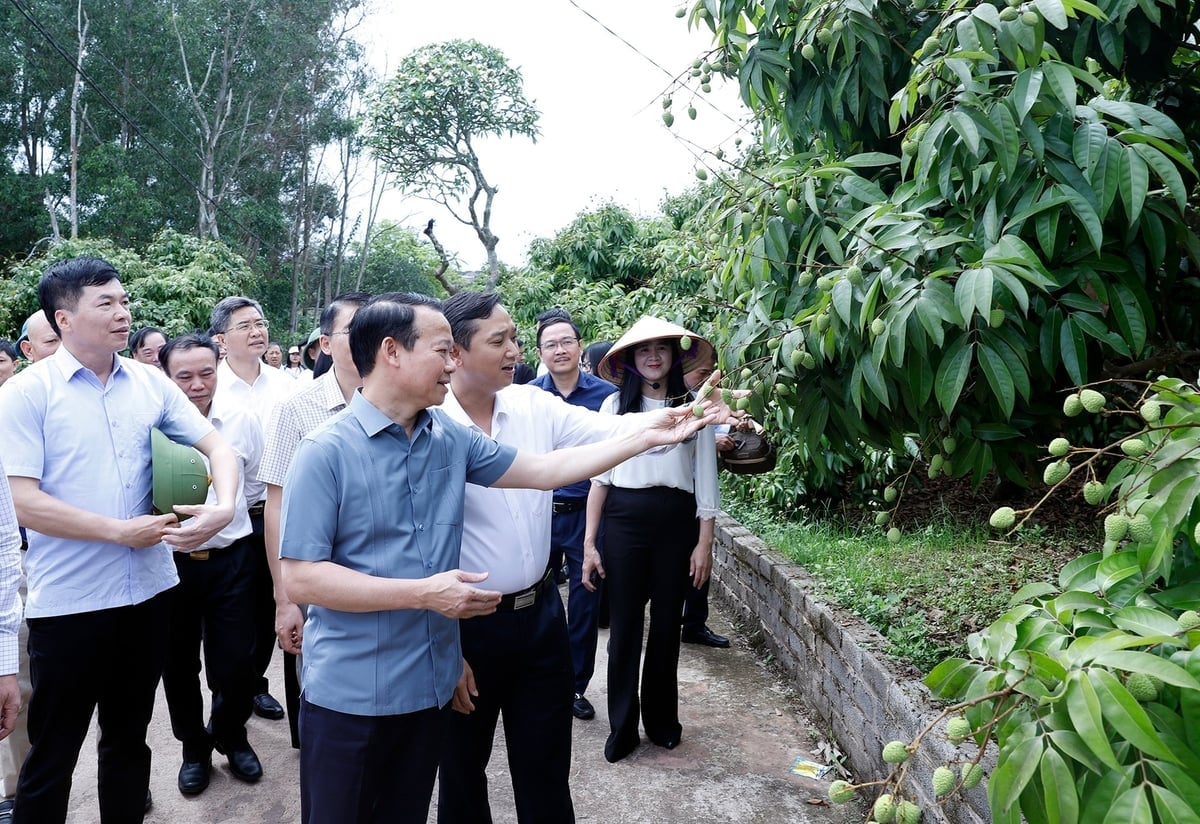
Minister Do Duc Duy and Chairman of the Provincial People's Committee Nguyen Viet Oanh inspected the lychee garden in Phuc Hoa commune, Tan Yen. Photo: Khuong Trung.
According to the itinerary, the delegation surveyed the lychee-growing area in Phuc Hoa commune and visited the VIFICO Company's packing facility. The Minister highly regarded the province's proactive and deliberate preparation for the 2025 lychee season, which encompassed expanding raw material areas, producing in accordance with export standards, and developing brands.
As per the report, Bac Giang is currently cultivating nearly 30,000 hectares of lychee, with an anticipated output of approximately 165,000 to 170,000 kilograms this year. The local population, businesses, and affiliated services are expected to generate an annual revenue of 6 to 7 trillion VND from lychee. Nevertheless, due to the crop's high export proportion, short harvest period, and extremely seasonal nature, it is still difficult to ensure stable pricing and efficient consumption.
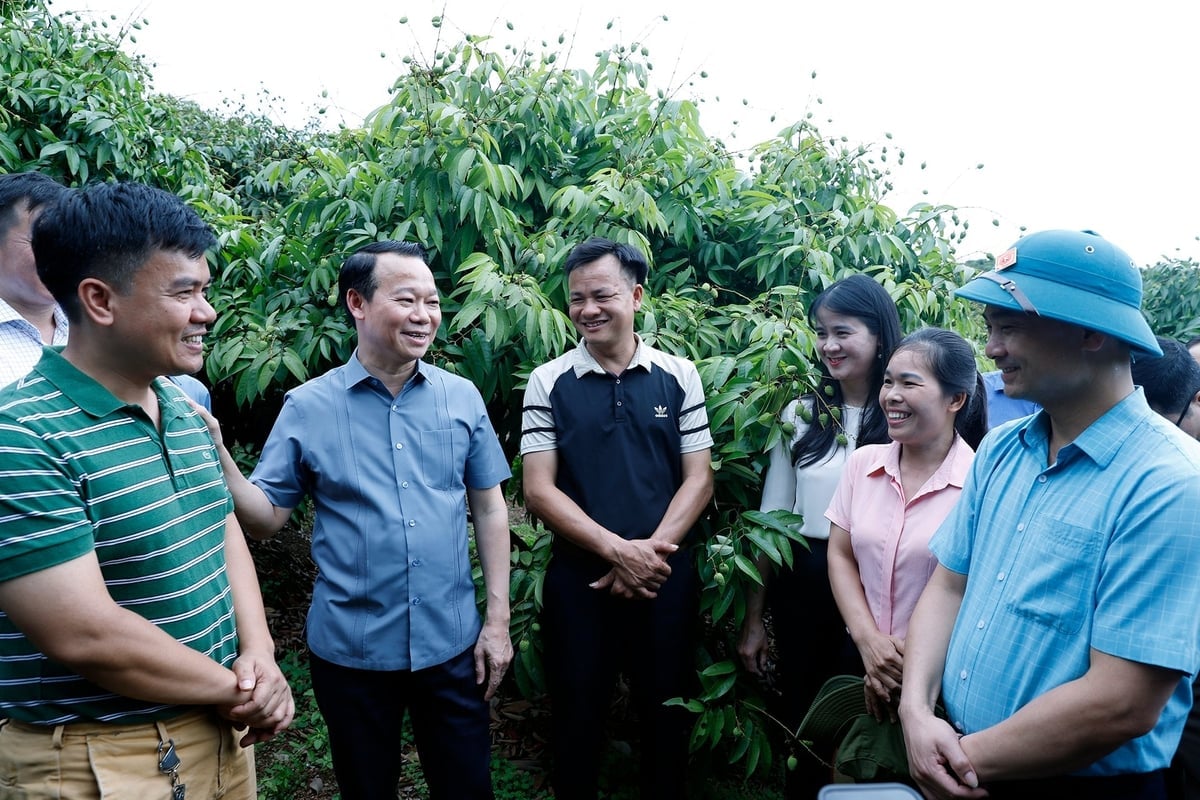
Minister Do Duc Duy discussed with lychee garden owners, agricultural extension officers, purchasing enterprises, and leaders of the district People's Committee on the afternoon of May 11. Photo: Khuong Trung.
According to the Minister, Bac Giang lychee has the potential to contribute up to 500 to 600 million USD to the country's total agricultural export turnover if consumption is effectively managed, particularly through the expansion of exports to high-quality markets like the US, Japan, and the EU, with an average price of 2 USD per kilogram.
In the agricultural sector, the contribution of localities such as Bac Giang is crucial in pursuing a total export turnover of 70 billion USD in agro-forestry-fishery products by 2025 and a growth rate exceeding 4%.
At the meeting, the Minister expressed his interest in learning more from local authorities and businesses about their production and consumption plans, risk mitigation measures for exports, and specific recommendations. "The Minister confirmed that we will promptly address any matter within our jurisdiction; however, we will compile and report any issues that fall outside of our jurisdiction to the Government and the Prime Minister in order to facilitate their timely resolution."

Minister Do Duc Duy and Chairman of the Provincial People's Committee Nguyen Viet Oanh took a souvenir photo with people from the lychee garden in Phuc Hoa commune, Tan Yen. Photo: Khuong Trung.
The meeting was regarded as an upward trend due to the substantial interest of the private sector in lychee and Vietnamese agricultural products in general, as evidenced by the large number of businesses from both within and outside the province that participated.
At a recent organic agriculture discussion, businesses and experts concurred that the sector continues to encounter substantial challenges despite its substantial potential. Nguyen Tat Hung of Global Import-Export Company stated that the demand for organic and "clean" produce in Vietnam is insufficient because many consumers are unable to differentiate between the two. Moreover, organic farming often leads to lower yields, unstable market access, and underutilised by-products.
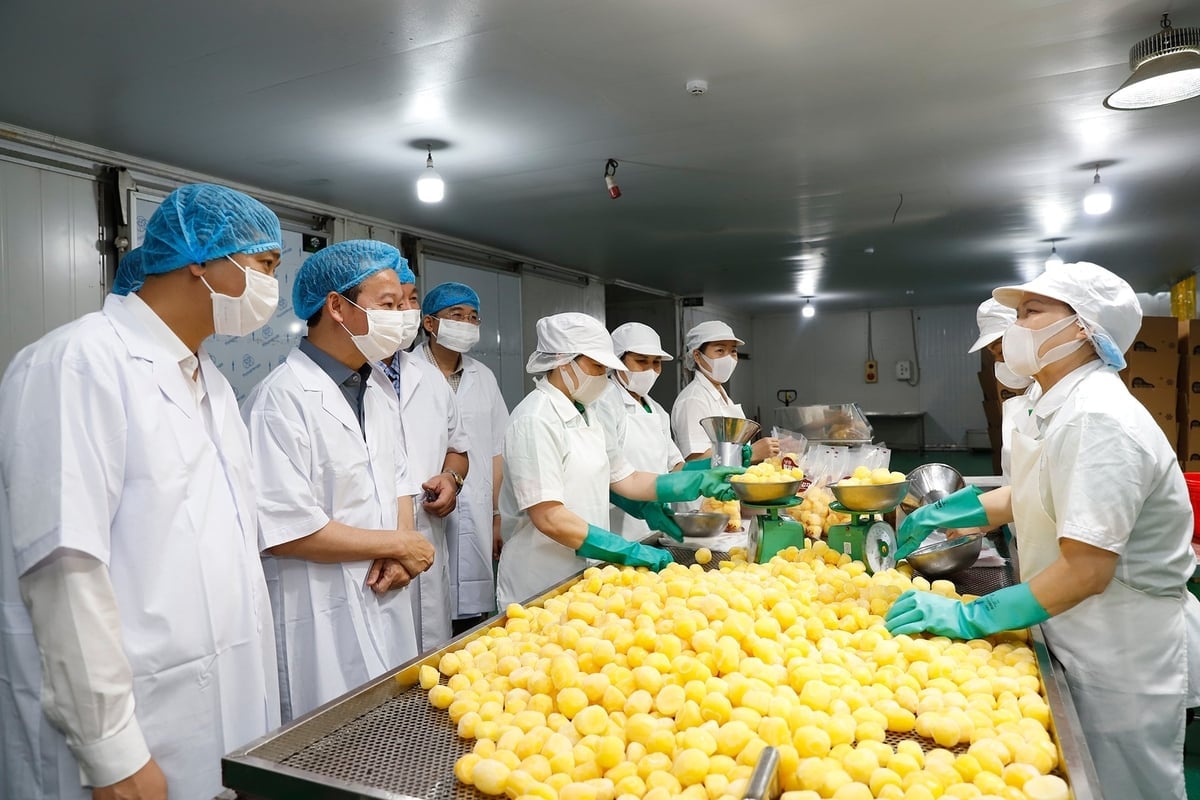
Minister Do Duc Duy inspects a fruit processing and export facility in the province. Photo: Khuong Trung.
Hung suggested various solutions, such as establishing minimum price mechanisms, improving agricultural by-product utilization through linkages, and developing a transparent domestic market. In addition, he urged the government to provide assistance in establishing raw material zones and distribution systems.
CEO of AMEII Vietnam, Ngo Thi Thu Hong, underscored the significance of deep processing in order to diversify offerings and increase the value of products. She observed, however, that Vietnam's processing industry continues to be underdeveloped in terms of waste management and by-product utilization. Businesses are directly affected by challenges such as fluctuating oil prices and rigid export pricing policies, which Hong also emphasized. She suggested a more adaptable regulatory framework in order to facilitate the improved response of enterprises to market dynamics.
In addition to assisting with product distribution, AMEII Vietnam has been investing in branding and raw material zones as a company that works closely with localities. As Hong stated, businesses anticipate that Vietnamese organic products will achieve greater success in both domestic and international markets with the ongoing assistance of the government and trade associations.
Chairman of the Bac Giang People's Committee, Nguyen Viet Oanh, disclosed that the province anticipates a harvest of approximately 165,000 tonnes of lychees this year, representing an 8% increase from 2024. This information was presented during a distinct session that concentrated on agricultural production. Several cultivation areas have fulfilled export standards and received geographical indications, indicating an improvement in product quality.
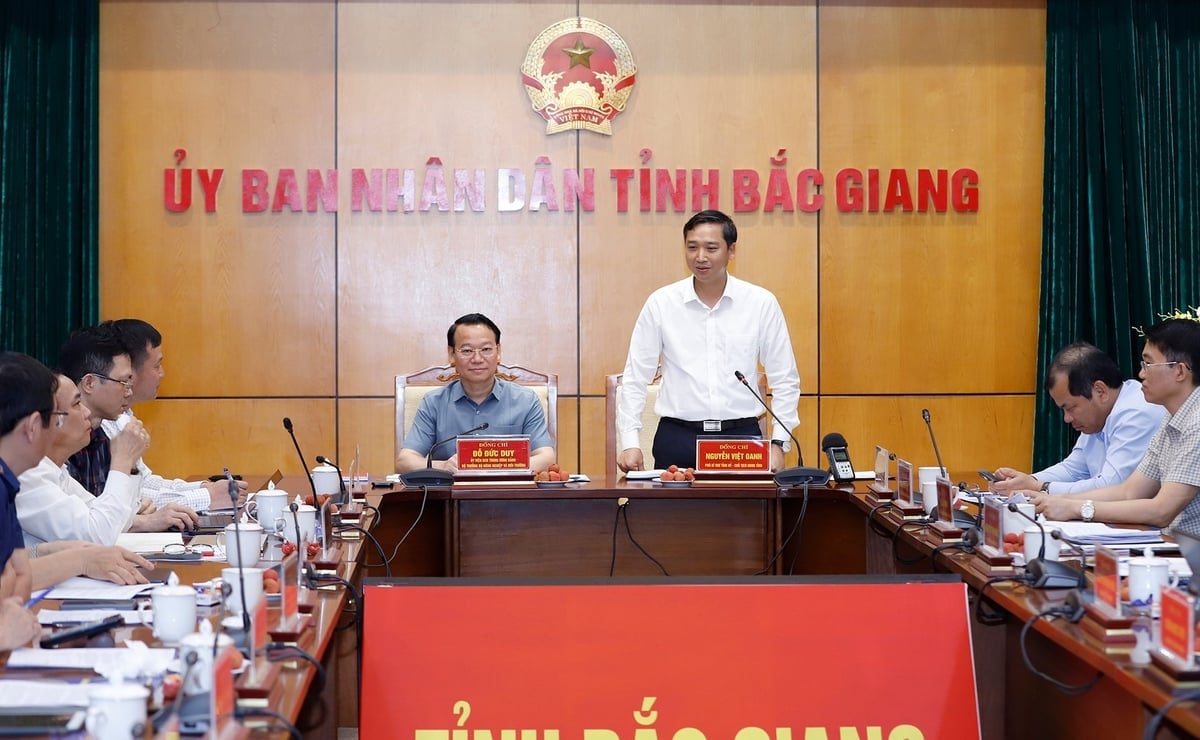
Chairman of Bac Giang Provincial People's Committee Nguyen Viet Oanh. Photo: Khuong Trung.
However, Bac Giang is facing numerous structural challenges. Soil quality assessments that are customized to specific regions were requested by the province in order to inform the development of suitable agricultural practices. Oanh encouraged the central government and relevant ministries to offer additional concessional credit to agricultural production and processing enterprises. He also emphasized the necessity of policies that promote deep processing in order to enhance the value of products and reduce reliance on raw produce markets.
Climate change and export market volatility continue to be significant concerns. To facilitate the adjustment of plans by farmers and businesses, Oanh requested the implementation of transparent market information channels and early warning systems.
In his concluding remarks, Minister of Agriculture and Environment Do Duc Duy recognized Bac Giang's socio-economic advancements, particularly in the agricultural sector. The province has attained a favorable investment environment, improved infrastructure, and high GDP growth. As a clear demonstration of its dedication to improving the value and repute of its primary agricultural product, the Minister emphasized Bac Giang's meticulous preparation for the forthcoming lychee season.
The Minister identified numerous strategic approaches. As an initial measure, he advocated for hard quality monitoring and production management. Local authorities must closely monitor weather patterns and insect outbreaks to provide timely guidance. All processing facilities and growing areas must be rigorously regulated in accordance with the assigned production codes, particularly in relation to pesticide residues, which are essential for export eligibility.
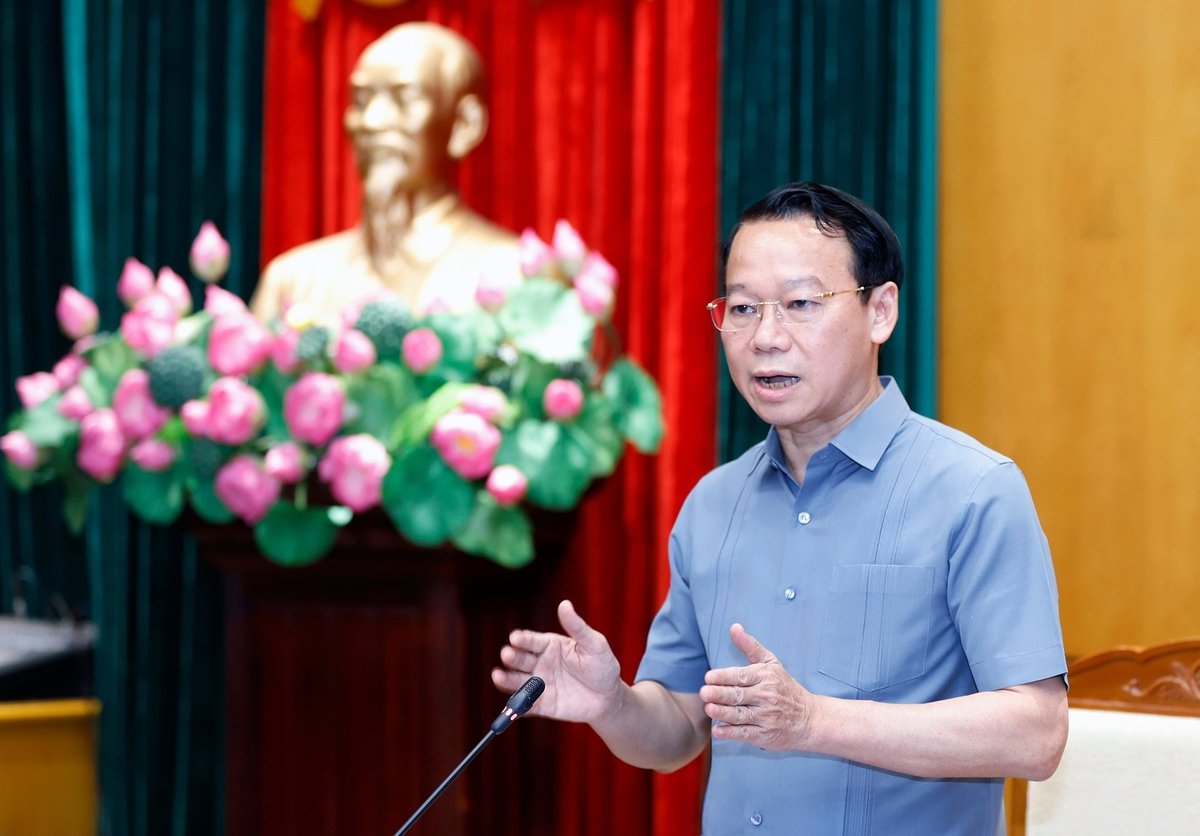
Minister Do Duc Duy concluded the meeting. Photo: Khuong Trung.
Secondly, the organization of lychee consumption must be more adaptable and in accordance with real-time market scenarios. Localities and cooperatives should prepare multiple sales scenarios, and purchasing support should be provided at the orchard level. It is recommended that distribution networks be expanded to encompass supermarkets, wholesale markets, and e-commerce platforms in order to capitalize on every potential sales opportunity.
Post-harvest preservation and logistics were designated as the "soft infrastructure" that determines lychee's competitiveness. To reduce losses and extend the shelf life, the Minister encouraged increased public-private collaboration to invest in cold storage and local processing centers.
In the long term, it is imperative to pursue deep processing and expanded export development. By investing in sophisticated preservation technologies, pre-processing, and irradiation, lychee will be able to enter premium markets beyond its short harvest window and become a year-round commercial product.
The Minister also emphasized the importance of the media in enhancing product positioning. It is recommended that Bac Giang collaborate with the local community and the press to advocate for lychee as a "green, clean, and high-quality" product that is trusted by consumers not only for its seasonal appeal but also for its intrinsic value.
Moving forward, the Ministry is focusing on optimizing agricultural calendars, restructuring raw material zones, and faster adoption of green technologies. Additionally, it advocated for strategic partnerships to facilitate digital transformation, science, and technology in agriculture.
Minister Duy reaffirmed the government’s commitment to supporting Bac Giang not only as Vietnam’s lychee capital but as a model for modern, sustainable agriculture. “Each lychee should act as a global ambassador for Vietnamese agricultural products,” he concluded.
Translated by Linh Linh

(VAN) Consumers have shown a preference for free-range eggs, but those farming systems are more vulnerable to biosecurity risks like bird flu.
/2025/05/09/5701-1-184335_301.jpg)
(VAN) Vietnam’s eel exports nearly doubled thanks to a mud-free farming model, opening up new prospects while still facing numerous barriers related to international standards.

(VAN) Minister Do Duc Duy warned that if production is not professionalized and supply chains are not transparent, the U.S. market could become a growth bottleneck.
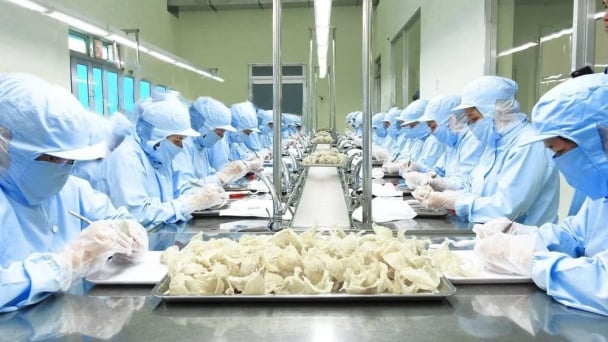
(VAN) Delegating surveillance responsibilities to local authorities is a cost-saving and efficiency-boosting measure that removes a key bottleneck for enterprises, according to Director General Duong Tat Thang.
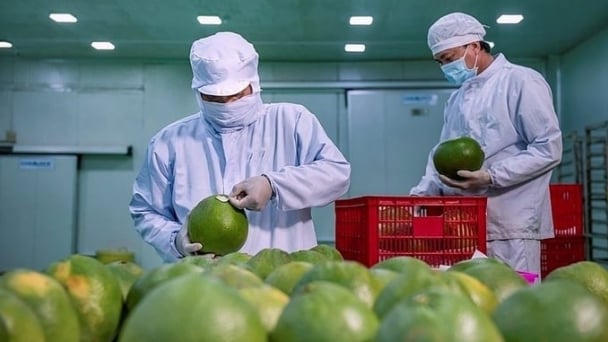
(VAN) Australia's final report on biosecurity has just been released, contributing to expanding the market for Vietnam's fruit with an output of nearly 1 million tons.
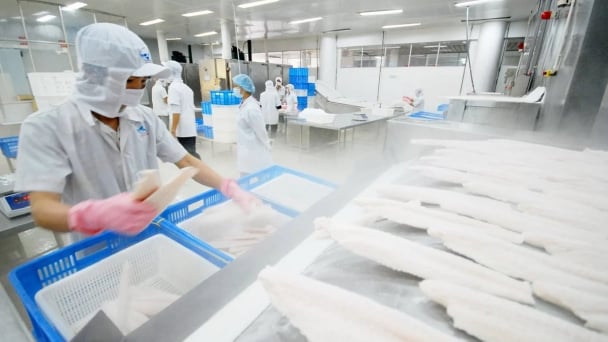
(VAN) According to the Vietnam Association of Seafood Exporters and Producers (VASEP), seafood export turnover in the first four months reached USD 3.09 billion, marking a 17% increase compared to the same period in 2024.